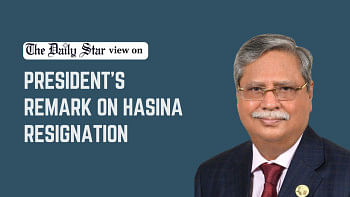Urgency for change must not lead to hasty decisions

We are concerned about the tendency, as evidenced by some recent events, to apply high-pressure tactics to hasten important decisions that otherwise need careful deliberation based on diverse and informed perspectives. The latest incident occurred on Tuesday evening, when several hundred protesters tried to break through security barriers in front of Bangabhaban demanding the resignation of President Mohammed Shahabuddin. The ensuing clash left five people with minor injuries, as police resorted to baton charges and tear gas to disperse the crowd. Last week, the same tendency was on display when student leaders led a protest on the Supreme Court premises demanding the resignation of "pro-Awami League fascist judges", forcing a decision that should have been reached following due process.
The controversy surrounding the president began after he claimed, in an interview with Manab Zamin, that he had only heard about Sheikh Hasina's resignation but found no "documentary evidence" of it. This, from a man whose retention after the fall of Awami League was deemed a constitutional necessity, sparked heated reactions as well as demonstrations in Dhaka and other districts. At the Central Shaheed Minar earlier on Tuesday, leaders of the Anti-Discrimination Student Movement issued an ultimatum to meet their five-point demand, including the president's removal, by the end of this week. Their other demands include annulment of the 1972 constitution, a permanent ban on Chhatra League, declaration of a "Proclamation of the Republic" to govern post-2024 Bangladesh, and invalidation of the 2014, 2018, and 2024 elections.
All these issues, we must say, have profound legal and political implications that cannot be taken lightly. Any forced decision risks not only creating new crises down the line but also weakening or disrupting the ongoing reform drive of the government. It cannot be denied that some of the demands raised by protesters have merit, having arisen from a backdrop of sustained grievances over decades. The power of mass mobilisation to effect change cannot be denied either, especially after the mass uprising. But the current political landscape is different. The interim government, born out of that uprising, has a mandate to reshape the nation's future through proper reforms, and it must be given constructive support—not threats or ultimatums—to do that since rushing through critical decisions could result in half-baked policies that fail to address the deeper issues plaguing the country.
The president's removal, for example, is a decision that needs political consensus which cannot be forced upon. If or when it happens, it must happen in a judicious, fully-thought-through manner that serves our long-term interests. The same goes for any decision related to the constitution. We have a nine-member reform commission currently reviewing the constitution. Demanding its instant annulment while such a body of experts is in place undermines the purpose of this process. If protesters push for immediate actions without regard for due process, what is the point of having all such commissions?
We, therefore, urge protesters, especially student leaders, to show the same maturity they did during the uprising. The current period, with so many actors of competing interests around, calls for caution and collaboration with the government to ensure the reform drive remains on course. If real, meaningful change is what we want, there is no alternative to constructive engagement.


 For all latest news, follow The Daily Star's Google News channel.
For all latest news, follow The Daily Star's Google News channel. 











Comments